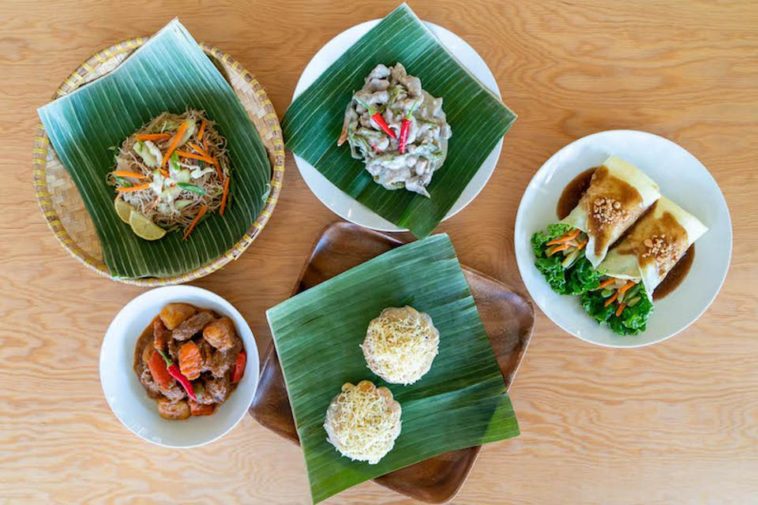Seattle’s Spice Bridge Food Hall Links Immigrant Cuisine To Local Community – Forbes
A new incubator program in a Seattle suburb is helping to bridge the gaps in starting a food business, by providing a work space for immigrants and minorities to serve their homeland’s cuisine.
Spice Bridge, a program through Global to Local’s Food Innovation Network, was launched last fall to provide women of color and immigrants in Washington State’s South King County with the necessary workspace and support.
Operating at Tukwila Village, a multi-purpose building about 10 minutes from downtown Seattle, about eight Spice Bridge vendors prepare and sell orders at rotating kiosks inside this new food hall.

At Spice Bridge, Wengay’s Kitchen prepares traditional Filipino meals and desserts.
Denise Miller/Global to Local
A Recipe For Starting A Business
According to Kara Martin, FIN’s program director, the concept for what would become Spice Bridge was stirred up about five years ago. At that time, Global to Local outreach staff learned that their community members were interested in starting their own food businesses but they didn’t know how to begin.
“That’s where we went to the next step,” said Martin. “We did a feasibility study that started our pilot project with Spice Bridge being the long-term vision but wanting to start working within the community in making sure that space is really part of design in the incubator program.”
Launched in 2017, the FIN program’s participants originally did catering or sold their food at farmers’ markets. Spice Bridge would change that and result from when city officials approached Global to Local about the development of the now Tukwila Village, a mixed commercial and residential property.
“They were really intrigued by the idea of being able to have more of a food hall type concept where it could support more than one business and that’s frequently more reflective of who is [in] the community,” explained Martin.

Spice Bridge’s WUHA Ethiopian-American Cuisine adjusts Ethiopian recipes to encourage everyone to … [+]
Denise Miller/Global to Local
At Tukwila Village, Spice Bridge contains four stalls where eight vendors divide their time over three days a week. Chosen through an application and interview process, and given a two-year slot, these vendors prepare their menu selections at a commissary kitchen with nine stations.
Having a soft opening in September, Spice Bridge contains mostly women-run businesses; two of them are managed by couples.
Along with providing essential resources, Martin noted that Spice Bridge means more than bringing these vendors’ food traditions to a central location. It helps newcomers to the area find a sense of place. “Anyone should be able to go out to eat with their family and find the foods that make them feel at home,” said Martin.

Krizia Cherece is the owner of Wengay’s Kitchen, one of the food businesses inside Spice Bridge.
Denise Miller for Global to Local
Representing Culinary Roots
Spice Bridge vendors share related experiences with cooking but all of them put forth foods and drinks from their different cultural backgrounds.
Krizia Cherece of Wengay’s Kitchen, which serves Filipino cuisine, said that while she slowly picked up an interest in cooking and baking while growing up alongside her mom in the kitchen (Wengay’s Kitchen is named her, too.).
During college, Cherece started making donuts and other sweet treats that enticed friends and family members to buy them from her. Cherece credited their encouragement in pushing her to pursue running her own food business. “I found that creating something and sharing it [with] other people was very fulfilling.”
Through Wengay’s Kitchen, Cherece is offering comfort foods and desserts from various regions of the Philippines. Her Bicol Express is a creamy coconut chicken dish full of sweet and spicy peppers. She also makes Lumpiang Sariwa, a spring roll with sauteed vegetables wrapped in an egg-based crepe and covered with a sweet peanut sauce, and Ube Ensaymada, a brioche densely packed with an ube jam filling and topped with butter, sugar and cheese.
“My dream of sharing what I create [with] others, and knowing that I can bring joy to other people, has been such a great feeling,” said Cherece.

Liyu Wirdaw, owner of WUHA Ethiopian-American Cuisine, presents some of her dishes offered through … [+]
Denise Miller for Global to Local
Liyu Wirdaw, who owns and operates WUHA Ethiopian-American Cuisine, started her business because she loves cooking. To her, food is an art form. “I like creating mouthwatering bites by mixing flavors, spices, and herbs from different cultures, and also recreating dishes by adding or substituting ingredients,” said Wirdaw.
From watching her mother cook, Wirdaw later went to culinary school and studied Western cooking, which encouraged her to experiment with different dishes. As an entrepreneur, she also wanted to provide related business solutions.
According to Wirdaw, she heard comments from Ethiopian food lovers about meal ordering dilemmas, from having long waits to being unable to finish large portions by themselves. Due to these issues, Wirdaw said, “They don’t get to have it as often as they would like to eat it.”
Through WUHA Ethiopian-American Cuisine, Wirdaw reduces spice levels, uses olive, grapeseed and other healthy cooking oils and has developed a quick “get in and get out” order setup.
“We’re also planning all-day breakfast days, with both American food like pancakes and Ethiopian food like tibs—and we’ll present things in a way that you wouldn’t expect,” she said.

At Spice Bridge, Theary Ngeth, owner of Theary Cambodian Foods, is proud to continue her Cambodian … [+]
Denise Miller/Global to Local
Theary Ngeth, who owns and operates Theary Cambodian Foods, originally did not imagine cooking as a career.
When she was younger, she saw how her mom tirelessly cooked meals for Cambodian elders at the South Park Senior Center in Seattle. “It was neither my interest in cooking, nor did I want to help her because I was just going through a teenager life,” she said.
All of that changed when Ngeth shared her homemade chili oil with a friend, who kept raving to her about how good it was. A year later, this friend told her about the FIN program, which led Ngeth to apply and share samples of her Cambodian cooking for review.
She only was focusing on preparing meals for her family and friends and at the senior center, as her mother did. “I guess what I hated at the beginning of my life has become my passion,” Ngeth added.
While excited about selling Cambodian food at Spice Bridge, Ngeth also said that she found that her native cuisine is hard to find in Washington State. Or even that not many customers have had it before at all. “I feel that Cambodian food is so unknown to the world, and only a few that are loved to travel actually get to go to Cambodia and get the taste of food,” she noted.
Her passion is also personal. Ngeth and her family left Cambodia during the Khmer Rouge and would come to live in the U.S. when she was a teen. As both a cook and a parent, Ngeth feels that by maintaining Cambodian cooking traditions, such as in making of Kroeung Curry Paste, she is bringing this culinary legacy to new customers and future generations.
“I want to keep my culture, my food, alive,” Ngeth said.
Spice Bridge at Tukwila Village is open Tuesday through Sunday and closed on Mondays. Visit their website for a complete schedule.
Published at Tue, 19 Jan 2021 14:30:00 +0000





Comments
Loading…